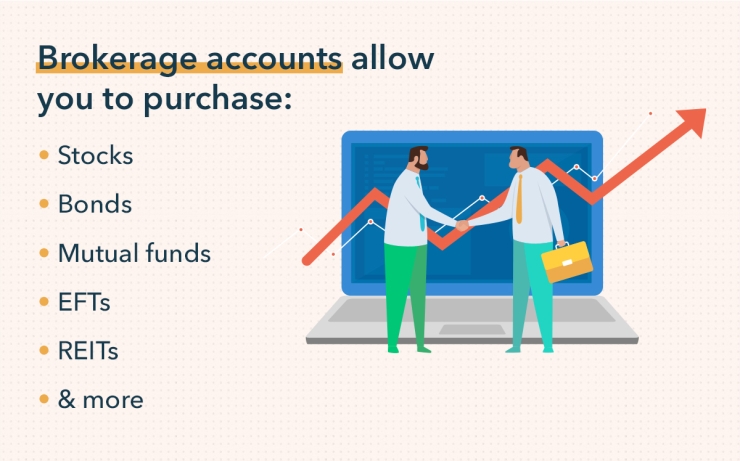Understanding Brokerage Accounts For Smart Investment Choices
Know more about brokerage accounts: learn the basics, choose the best providers for 2023, and embark on your investment journey confidently.
Author:Gordon DickersonReviewer:Habiba AshtonOct 03, 202312.7K Shares326.4K Views

Investing is a paramount strategy for wealth accumulation. For aspiring investors, grasping the fundamentals of brokerage accountsis pivotal. These accounts serve as platforms for trading various financial instruments and provide access to numerous investment opportunities. This article offers an in-depth exploration of brokerage accounts, highlighting their operation, benefits, and potential drawbacks.
What Is A Brokerage Account?
A brokerage account is an arrangement allowing individuals to buy and sell financial instruments such as stocks, bonds, and mutual funds. Unlike traditional bank accounts, brokerage accounts provide access to the stock market, offering a broader spectrum of investment opportunities.
Benefits And Uses Of A Brokerage Account
Understanding what you can do with a brokerage account is crucial for maximizing its potential. A brokerage account is not just an account; it’s a gateway to the world of investments. It enables you to delve into various markets, allowing for the purchase and sale of diverse securities such as stocks, mutual funds, ETFs, and more.
By opening a brokerage account, you embark on the journey of building your personal investment portfolio. This step is fundamental in laying the groundwork for your future financial security and achieving specific financial goals. Here are the primary activities you can undertake with a brokerage account:
- Engage in the Trading of Various Securities - Utilize your brokerage account to buy and sell stocks, mutual funds, ETFs, and other investment instruments. This functionality is at the core of a brokerage account, offering you the flexibility to make investment choices aligned with your financial goals and risk tolerance.
- Leverage Potential Long-Term Growth - Investing through a brokerage account allows you to tap into the potential long-term growth of various markets, contributing to the accumulation of wealth over time.
- Allocating Funds for Future Objectives -Utilize your brokerage account to set aside funds for pivotal future needs including retirement, college tuition for your children, or accumulating a down payment for a house.
- Access to Comprehensive Investment Resources - A brokerage account provides you with valuable access to extensive investment research, diverse tools, and myriad investment strategies. This benefit empowers you to make informed investment decisions, optimizing your investment portfolio’s performance.
In essence, a brokerage account is a multifaceted platform that not only facilitates the trading of securities but also acts as a comprehensive resource for investment information, tools, and long-term financial planning.
Flexibility And Tax Implications
Brokerage accounts stand out for their flexibility in contribution and withdrawal, devoid of restrictions or penalties typical of other investment vehicles. However, they are taxable, meaning investment income accrued is subject to capital gains taxes.
Delyanne Barros, a renowned money coach, underlines the significance of long-term investment in leveraging tax advantageswithin brokerage accounts. Adopting a long-term investment approach can potentially lead to favorable tax brackets and enhanced returns.
How Do Brokerage Accounts Work?
Opening An Account
The contemporary digital landscape enables effortless online brokerage account creation. Although some brokers don't require an initial deposit, account funding is obligatory for commencing investment activities.
Brokerage Operations
Brokerage accounts function as intermediaries between you and your investments. Brokers manage your funds and facilitate transactions, with no restrictions on the number of accounts or yearly contributions. Generally, opening a brokerage account involves no fees.
Brokerage Accounts Vs. Retirement Accounts
Contrasting with retirement accountslike IRAs, brokerage accounts follow different tax and withdrawal norms. While retirement accounts offer specific tax benefits tailored for long-term savings, brokerage accounts entail post-tax contributions and taxable earnings. Notably, Roth IRAs, while similar to brokerage accounts in involving post-tax contributions, offer tax-free withdrawals post 59½ years of age and a five-year account holding period.
Choosing A Brokerage Account Provider
Online Brokerage Account
Investors inclined towards active investment management might favor online brokerage accounts, granting users autonomy to execute trades via online platforms.
Managed Brokerage Account
Alternatively, managed brokerage accounts, employing human or robo-advisors, are available. Robo-advisors, utilizing algorithms for investment decisions based on your goals, have surfaced as an affordable substitute for human advisors.
Setting Up A Brokerage Account
After online application and funding, investors must opt between cash and margin accounts. Beginners are typically recommended a cash account to avoid the risks and interests associated with borrowing in margin accounts.
Factors To Consider When Choosing A Brokerage
- Available Investments: Ensure accessibility to your desired funds and scrutinize related fees and minimum investment mandates.
- Ease of Use: Evaluate the user-friendliness and functionality of broker platforms by creating and navigating an account.
- Fund Availability: Ascertain the availability and fee structure of your desired funds.
- Fees and Minimums: Investigate fee structures and investment minimums of different brokers.
Case Example
Mainstream brokers like Schwab or Fidelity typically offer free trades for ETFs and mutual funds, with some extending no-fee access to diverse mutual funds.
Transferring Brokerage Accounts
Familiarize yourself with account transfer processes to avoid unnecessary charges. Most brokers allow smooth account transfers without compelling you to sell your securities, thereby preventing taxable events.
Key Points For Account Transfers
- Confirm the fee-free sale of specific funds before transferring mutual funds.
- Utilize ETFs to facilitate account transfers as they negate the necessity for transitioning from unavailable mutual funds.
- Be aware of potential transfer-out fees from your previous broker, and consider negotiating with your new broker to cover these fees.
The Best Brokerage Accounts 2023
Let's explore the best brokerage accounts in 2023, detailing each broker's ratings, account minimums, and other significant details. This information will help you in choosing the right brokerage account that suits your investing needs and preferences.
Fidelity Investments - Best Overall, Best Broker For ETFs, And Best Broker For Low Costs
Rating: 4.8
Account Minimum: $0
Fees: $0 for stock/ETF trades, $0 plus $0.65/contract for options trade
Fidelity continues to stand out as the top pick overall. It provides a comprehensive experience to both its institutional and retail clients with advanced tools, all at a low price.
Despite a few downsides like higher broker-assisted trade fees and minimum balance for some index trading, Fidelity's ongoing commitment to enhancing its products and services solidifies its place as a leading brokerage firm. Its innovative moves, such as launching a Digital Assets Account and introducing various ETFs, keep it ahead in the competition.
TD Ameritrade - Best Broker For Beginners And Best Broker For Mobile
Rating: 4.5
Account Minimum: $0
Fees: $0 for equities/ETFs, $0.65 per contract for options, Futures $2.25 per contract
TD Ameritrade is renowned for its user-friendly platform, making it the best broker for beginners and mobile users. Even though it does not offer fractional shares, its comprehensive educational content, and superior trading technology make it a favored choice for many investors.
Interactive Brokers - Best Broker For Advanced Traders And Best Broker For International Trading
Rating: 4.2
Account Minimum: $0
Fees: Varied based on activity and platform used
Interactive Brokers stands out for advanced and international traders due to its broad range of global assets and advanced analytical tools and calculators. However, the SmartRouting feature is not available to IBKR Lite clients, and the TWS platform can be challenging to learn.
Tastytrade Formerly Tastyworks - Best Broker For Options
Rating: 3.9
Account Minimum: $0
Fees & Commissions: $0 stock trades, $1 to open options trades (capped at $10 per leg), $0 to close
Tastytrade is the best option for options trading, optimizing tools and content to cater to its options-focused client base. Despite its limited investment options and weak portfolio analytics, its capped commission structure and superior tools for analyzing and monitoring options trades make it an appealing choice for options traders.
Where Does A Brokerage Account Fit In Your Investment Journey?
In the midst of evaluating different brokerage accounts, it's essential to understand the role of a brokerage account in your investment journey. Opening a brokerage account is a significant step toward building your personal investment portfolio. It provides you access to various investment opportunities, including stocks, mutual funds, ETFs, and other securities.
Not only does it allow you to buy and sell these investments, but it also offers the potential for long-term growth. By efficiently managing your brokerage account, you can set aside money for retirement or other significant goals like college tuition or a down payment.
In addition, a brokerage account grants you access to extensive investment research, tools, and strategies, empowering you to make well-informed investment decisions.
Brokerage Accounts FAQs
Can I Lose Money In A Brokerage Account?
Yes, investing through a brokerage account carries the risk of losing money. The value of your investments can fluctuate due to market conditions, and it's possible to lose the principal amount you invested. It's crucial to conduct thorough research and consider your risk tolerance before investing.
Are Brokerage Accounts Insured?
Brokerage accounts are not insured like bank accounts. However, the Securities Investor Protection Corporation (SIPC) protects investors up to $500,000 (including a $250,000 limit for cash) in the event a brokerage firm fails. This does not protect against losses from the market.
Can I Open A Brokerage Account With Bad Credit?
Generally, you can open a brokerage account even with bad credit. Brokerage firms are more concerned with your ability to fund the account than your credit score. However, a poor credit score may impact your ability to be approved for a margin account within the brokerage.
Can I Withdraw Money From My Brokerage Account Whenever I Want?
Yes, you can generally withdraw cash from your brokerage account at any time. However, it's essential to note the settlement period that applies to the sale of investments - typically two business days for stocks and ETFs. Additionally, withdrawing funds from investment types like IRAs may incur taxes and penalties if done prematurely.
Do I Need A Lot Of Money To Open A Brokerage Account?
No, many brokerage firms have no or low minimum deposit requirements to open an account. Some brokers like Fidelity Investments and TD Ameritrade have a $0 account minimum. However, you will need enough money to purchase the investment you are interested in, which may vary.
Note:The above information should provide a general overview and may not apply to all brokerage firms. Always make sure to do additional research or consult with a financial advisor to understand all aspects fully.
Conclusion
In summary, brokerage accounts present a valuable avenue for diverse investments beyond conventional retirement accounts. Aligning your investment choices with long-term objectives is paramount for financial growth and stability. Whether your goals encompass retirement, home acquisition, or return maximization, comprehensive awareness of brokerage accounts is essential for informed financial decision-making. The investment world, filled with opportunities, awaits those ready to navigate it with knowledge and confidence.

Gordon Dickerson
Author

Habiba Ashton
Reviewer
Latest Articles
Popular Articles

